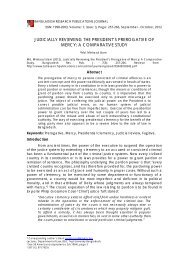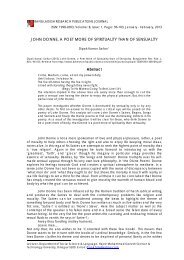farmers' attitude towards sustainable agricultural practices
farmers' attitude towards sustainable agricultural practices
farmers' attitude towards sustainable agricultural practices
Create successful ePaper yourself
Turn your PDF publications into a flip-book with our unique Google optimized e-Paper software.
Ghosh and Hasan.The application of modern <strong>agricultural</strong> science and technology has contributed toincrease productivity of agriculture in the last half-century. The successes of agriculture,however, have been accompanied by many ecological problems. Today, both rural andurban inhabitants feel threatened by dangers posed to the environment by modern<strong>agricultural</strong> <strong>practices</strong> such as the heavy use of chemicals. An alternative farming strategycalled <strong>sustainable</strong> agriculture promises remedies to the problems created by industrializedchemical based agriculture, if <strong>sustainable</strong> agriculture can be shown to be viable andbecome widely accepted (Roling and Wagemakers, 2002).Currently, the world shows extensive worries on the destructive effects of advanced<strong>agricultural</strong> technologies on the environment, natural resources and long termsustainability of agronomy systems. Soil degradation, erosion, water pollution, excessiveuse of chemicals, waste of water, decreasing ground water tables, destruction of naturalhabitats for wildlife and insects and pests resistance against insecticide and pesticide areonly a few of the concerns expressed by environmentalists, ecologists, <strong>agricultural</strong>professionals, policy makers, farmers and public (Leeuwis, 2004; Al-Subaiee et al., 2005).Despite these environmental effects at many places, the modern agriculture has beeninvolved in many economic and social changes both in the industrial and developingcountries. Sustainable agriculture, as a managerial philosophy and a system that provides<strong>agricultural</strong> needs of both present and future generations has raised as a major challengeof the 21 st century to meet these complications and natural and human difficulties; that is,agriculture should be consume less and be <strong>sustainable</strong> more (Williams, 2000; Qamar, 2002;Rasul and Thapa, 2003; Shariate and Hosseyni, 2003; Leeuwis, 2004; Shahvali and Abedi,2005; Ahmadvand et al., 2005).Sustainable agriculture’ as “farming that makes the best use of natural goods and serviceswhile not damaging the environment. It minimizes the use of no renewable inputs(pesticides and fertilizers) that damage the environment or harm the health of farmersand consumers. In addition, it makes better use of the knowledge and skills of farmers”(Duesterhaus, 1990).The concept of <strong>sustainable</strong> <strong>agricultural</strong> <strong>practices</strong> is of concern forfarmers, extension agents, <strong>agricultural</strong> education teachers, and others working in<strong>agricultural</strong> related occupations. Sustainability requires a holistic approach in order tounderstand the whole as an aggregation of interwoven parts working together (Hartfieldand Karlen, 2001). The performance of <strong>sustainable</strong> <strong>agricultural</strong> <strong>practices</strong> is judged not interms of how each practice works separately, but in terms of how the individual <strong>practices</strong>fit together and relate to each other, and how the systems that result relate to theirenvironment and to other systems in the environment (Roling and Wagemakers, 2002). Theultimate goal or the ends of <strong>sustainable</strong> agriculture is to develop farming systems that areproductive and profitable, conserve the natural resource base, protect the environment,and enhance health and safety, and to do so over the long-term. Considering the abovementioned facts, the study was undertaken with the following objectives:1. To determine the selected socio-demographic characteristics of farmers;2. To determine the <strong>attitude</strong> of farmers <strong>towards</strong> <strong>sustainable</strong> agriculture;3. To explore the relationship between selected characteristics of the farmers andtheir <strong>attitude</strong> <strong>towards</strong> <strong>sustainable</strong> agriculture.MethodologyLebutala and Ichali union of Jessore Sadar upazila of Jessore district were selected as thelocale of the study. All farmers of Tejrol village of Lebutala union and Rajapur village ofIchali union were the population of the study. At first two villages, Tejrol and Rajapur wereselected randomly from two unions. Total number of farm families in Tejrol and Rajapurwere 334 and 267 respectively. 50 farmers from Tejrol village and 40 farmers from Rajapurvillage were selected as sample following two-stage proportionate random samplingtechnique. Thus the total number of sample respondents was 90. Face to faceinterviewing by using structured interview schedule was used to collect data and theentire process of data collection were done from February to March, 2012.Measurement of dependent variableFarmers’ <strong>attitude</strong> <strong>towards</strong> <strong>sustainable</strong> <strong>agricultural</strong> <strong>practices</strong> was considered as thedependent variable of this study. Farmer’s <strong>attitude</strong> was measured by asking his opinion228http://www.bdresearchpublications.com/journal/
















